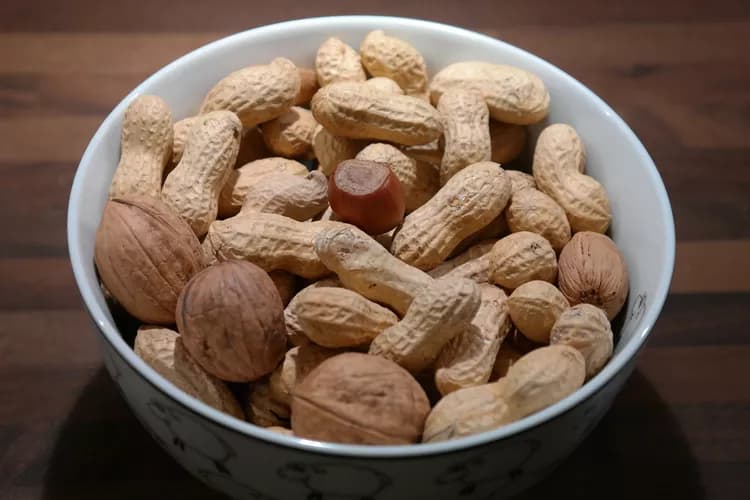A research article published in the International Journal of Epidemiology found that the consumption of whole nuts and peanuts rendered a protective effect against dying from cancer, heart disease, respiratory disease, diabetes, neurodegenerative diseases, etc. Surprisingly, consumption of peanut butter did not offer the same benefits as consuming whole peanuts.
Nuts are considered a nutrient-dense food, rich in fiber, minerals, vitamins, and especially mono- and poly-unsaturated fatty acids. They are also loaded with bioactive nutrients such as antioxidants and phytosterols. Nuts have long been associated with heart health. Indeed, several studies have found that daily intake of tree nuts, like almonds, walnuts, pecans, pistachios, etc., and peanuts could actually aid in lowering the “bad” cholesterol.
A large, multi-center study is Spain found reduced cardiovascular risk with a Mediterranean diet rich in olive oil and nuts. Additionally, a cohort study of female nurses and male healthcare professionals in the USA found that those who included nuts on a regular basis in their diets were likely to be leaner, less likely to smoke, more likely to exercise, and consumed more fruits/vegetables. Also, those who consumed nuts regularly, both men and women, were found less likely to die of cancer, heart problems, and respiratory-related causes.
The current study sheds more light on the link between nut consumption and reduced mortality as a result of various conditions and diseases. The investigation and analyses were carried out within the Netherlands cohort study, which started in 1986 and involved over 120,000 men and women. The participants, a sub-cohort of over 5000, were randomly sampled and followed up since 1986 for this study. The major findings are:
- Men and women who ate at least 10g of nuts in a day showed a lower risk of dying from several causes of death when compared to individuals who did not eat nuts.
- The strongest correlation was observed in death owing to the respiratory disease.
- Strong correlations were observed for nut consumption and reduced mortality owing to neurodegenerative disorders and diabetes, followed by cancer and cardiovascular diseases.
- Consistent risk reduction was observed for cancer and respiratory illnesses.
- Both men and women, who consumed nuts, showed reduced mortality due to the causes mentioned above.
- Tree nuts and peanuts showed comparable effects.
- Peanut butter consumption did not show any correlation/s with reduced mortality.
Regarding findings with peanut butter being ineffective in reducing mortality, the authors opine that added sodium and partially hydrogenated oils during the processing of peanut butter probably counteract the health benefits of peanuts.
Project leader and epidemiologist Professor Piet van den Brandt of Maastricht University Medical Centre, Netherlands, said in an Oxford University Press release, “It was remarkable that substantially lower mortality was already observed at consumption levels of 15 grams of nuts or peanuts on average per day (half a handful). A higher intake was not associated with further reduction in mortality risk. This was also supported by a meta-analysis of previously published studies together with the Netherlands Cohort Study, in which cancer and respiratory mortality showed this same dose-response pattern.”
The findings in the study definitely advocate adding “half a handful” of mixed nuts to the daily diet. However, people with nut allergies should refrain from eating nuts to avoid serious and potentially life-threatening allergic reactions.
Written by Mangala Sarkar Ph.D.
Primary Reference:
(n.d.). Retrieved June 18, 2015, from http://www.alphagalileo.org/ViewItem.aspx?ItemId=153534&CultureCode=en
Brandt, P., & Schouten, L. (2015). Relationship of tree nut, peanut and peanut butter intake with total and cause-specific mortality: A cohort study and meta-analysis. International Journal of Epidemiology.
(n.d.). Retrieved June 18, 2015, from http://ije.oxfordjournals.org/content/early/2015/05/26/ije.dyv039.full.pdf html?sid=cf08c30b-a1fb-4769-b30b-96791a62ec3f
Additional References:
Ros, E. (2010). Health Benefits of Nut Consumption. Nutrients, 2(7), 652-682.
Bao, Y., Han, J., Hu, F., Giovannucci, E., Stampfer, M., Willett, W., & Fuchs, C. (2013). Association of Nut Consumption with Total and Cause-Specific Mortality. New England Journal of Medicine, 369, 2001-2011.
Estruch, R., Ros, E., Salas- Salvado, J., Covas, M., Corella, D., Aros, F., . . . Martinez-Gonzales, M. (2013). Primary Prevention of Cardiovascular Disease with a Mediterranean Diet. New England Journal of Medicine, 368, 1279-1290.
Related Articles
Test Your Knowledge
Asked by users
Related Centers
Related Specialties
Related Physicians
Related Procedures
Related Resources
Join DoveHubs
and connect with fellow professionals


0 Comments
Please log in to post a comment.